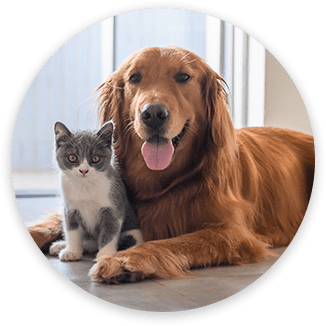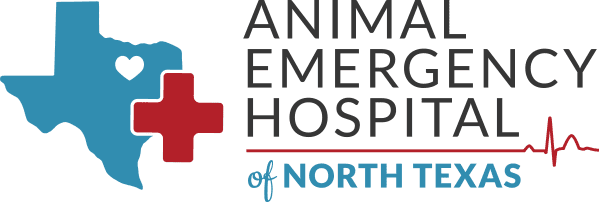If signs are pointing to an emergency, don't wait.
Call us immediately.

Emergency Veterinary Services
At Animal Emergency Hospital of North Texas in Grapevine, we provide high-quality and compassionate emergency and critical care for pets all day, every day. Our in-house laboratory, digital radiography, and focused ultrasound capabilities allow us to quickly evaluate your pet and create a tailored treatment plan.
We feel it is very important to involve your primary care veterinarian (who else knows your pet best?) in a collaborative way to make sure your pet is getting the best care possible. Since Animal Emergency Hospital of North Texas is part of a larger referral hospital, we have the ability to have your pet evaluated by any one of many board-certified specialists if the need arises without your pet ever having to leave the property!
In addition to dogs and cats, all of our doctors treat avian and exotic species on an emergency basis. We apologize for any inconvenience, but we do NOT provide care to monkeys OR large hooved animals such as cows, pigs, sheep, goats, and horses.
We Only Provide Emergency Services
We often get asked whether we provide routine care, such as vaccinations or spays and neuters. Due to the special needs of our hospital, which is dedicated solely to emergency and critical care, routine health maintenance is not available. These services should be provided by your primary care veterinarian. If you are looking for a primary care veterinarian, we can recommend our sponsors.
Our Location
We Only Provide Emergency Services
We often get asked whether we provide routine care, such as vaccinations or spays and neuters. Due to the special needs of our hospital, which is dedicated solely to emergency and critical care, routine health maintenance is not available. These services should be provided by your primary care veterinarian. If you are looking for a primary care veterinarian, we can help you find one. Just ask us!
Fees and Payment for Pet Emergency Treatment
When one of our veterinarians evaluates your pet, an initial exam and consultation fee are assessed. If further diagnostics and treatments are needed, our staff can provide you with an itemized estimate of these services prior to proceeding with your pet’s care.
Our typical fees are:
Exam fee: $170
Holiday Exam fee: $195
All fees must be paid in full prior to your pet’s discharge from Animal Emergency Hospital of North Texas.
For payment, we accept:
- Cash
- Visa
- Discover
- MasterCard
- American Express
- Care Credit
- Personal Checks*
*Please note that personal checks are verified and approved through CrossCheck. Always bring an ID and a second form of payment, to be safe.
If you are interested in Care Credit, you can apply at our hospital, online, or over the phone by calling 1-800-839-9078.


Is It an Emergency?
Think your pet is having an emergency? Pets can’t tell us what’s hurting, and you may question what indicates an emergency. Never hesitate to call us if you think your pet may be having an emergency. Our knowledgeable, caring veterinary technicians will quickly assess whether your pet needs immediate attention. Even if your pet doesn’t need prompt care, our technicians may be able to put your mind at ease.
These listed problems can be extremely serious and indicate that your pet should be seen immediately! We partner with your veterinarian to offer care during hours when they may not be in the office, if they feel your pet needs additional diagnostics or 24-hour care, or if they recommend a consultation with a veterinary specialist.
- Any problem related to your pet’s eyes (redness, squinting, discharge, bulging, unequal pupils, loss of vision)
- Ingestion of any object that is not meant to be ingested (clothing, toys, small objects, bones, fishhooks)
- Ingestion of a toxic substance (this is an extremely long list!!—call us if you are unsure if what your pet consumed is dangerous)
- Labored or distressed breathing
- Collapse
- Unrelenting vomiting or diarrhea, especially if any blood is noticed (blood can appear bright red, dark red or dark/tarry/black)
- Unproductive retching
- First-time seizure, > 2 seizures in 24-hours or any seizure activity lasting longer than 5 minutes
- Abnormal gait (favoring a limb, lameness, stumbling, loss of coordination, unable to use a limb)
- Distended/swollen/painful belly
- Discoloration of the skin, eyes or gums (especially bruising, redness, paleness or yellow color)
- Difficulty urinating (straining, dribbling, change in frequency, unable to urinate)
- Abnormal urine color (pink, red, brown or wine-colored)
- Snake bites
- Trauma (significant falls, hit by a car, dog fight wounds, attacked by an animal)
- Overheating/heat stroke
- Bleeding
- Skin wounds
